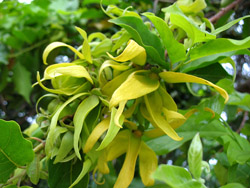| |
|
Ylang-Ylang Essential Oil (Artabotrys
odoratissimus)
 |
Originating in the Philippines, ylang ylang means
“flower of flowers” or “fragrance of all fragrances.” This fragrance is
traditionally used in aromatherapy to sharpen the senses and to temper
depression, fear, anger, and jealousy. For these reasons, and also because of
its reputation as an aphrodisiac, the flowers are spread on the beds of the
newly married in Indonesia.
Modern aromatherapists
find the scent strongly sedating, easily sending the most reluctant sleeper off
to dreamland. Science, on the other hand, regards ylang ylang essential oil more
as a mental stimulant. Can it be both? Quite possibly it stimulates people’ s
minds in one way while relaxing them in another.
Ylang ylang is also widely used as a cosmetic when
mixed with coconut oil. People throughout the tropics use it to protect their
hair from salt water damage. Today, as one of the most abundant and least
expensive of the true floral-smelling essential oils, it is a favorite in
perfumes and cosmetics and is even added to some beverages and desserts. The
essential oil varies greatly due to climatic and botanical differences. As a
result, there are several commercial grades with distinct scents.
Principal constituents of ylang ylang: Linalol,
geraniol, eugenol, safrol, ylangol, linalyl benzoate, linalyl acetate, alpha
pinene, benzoic acid, cadinene, caryophylelene, creosol, isoeugenol
Therapeutic properties of ylang ylang: Antidepressant;
stimulates circulation, relieves muscle spasms, lowers blood pressure, relaxes
nerves
Uses for ylang ylang: Of all the essential oils, ylang
ylang is one of the best at relaxing the mind and the body. Simply sniffing it
can slightly lower blood pressure, although taking a bath with the oil or using
it in a massage oil greatly enhances the relaxation experience. It can be
helpful in cases of stress, shock, or anxiety. When used as a hair tonic, it
balances oil production. Add about 6 drops to every ounce of hair
conditioner.
Ylang-ylang oil
benefits any type of skin but is most effective in treating oily skin. It
balances oil production, reducing excessive oiliness. By fighting bacterial
infection, it helps control acne and blemishes. Ylang-ylang oil softens and
smoothes skin, and stimulates new cell growth. It reportedly can ward off
wrinkles and premature aging because it relaxes facial muscles and releases
facial tension that can contribute to lines, wrinkles and sagging
skin.
Disclaimer: The information presented
herein is intended for educational purposes only. These statements have not
been evaluated by the FDA and are not intended to diagnose, cure, treat or
prevent disease. Individual results may vary, and before using any supplements,
it is always advisable to consult with your own health care
provider.
|
|
|


















